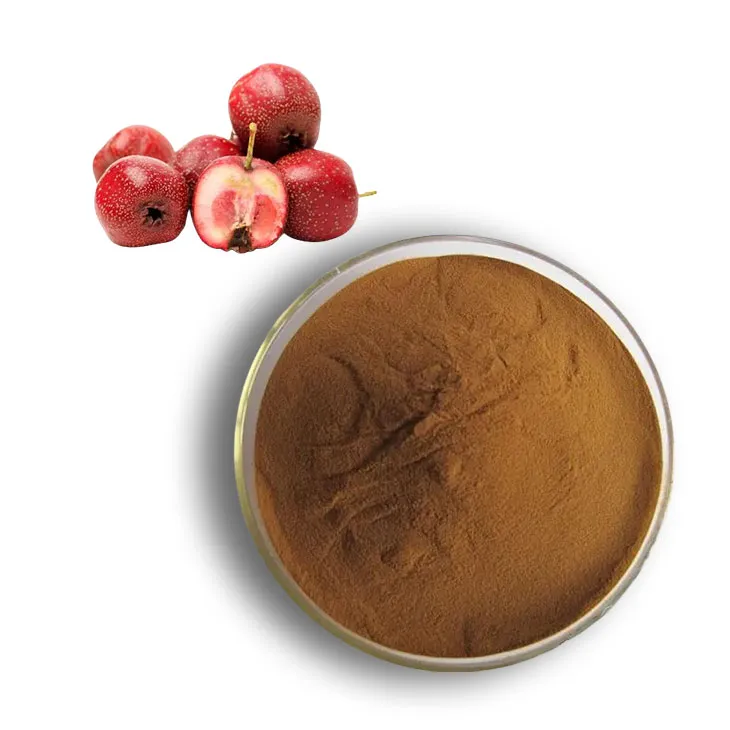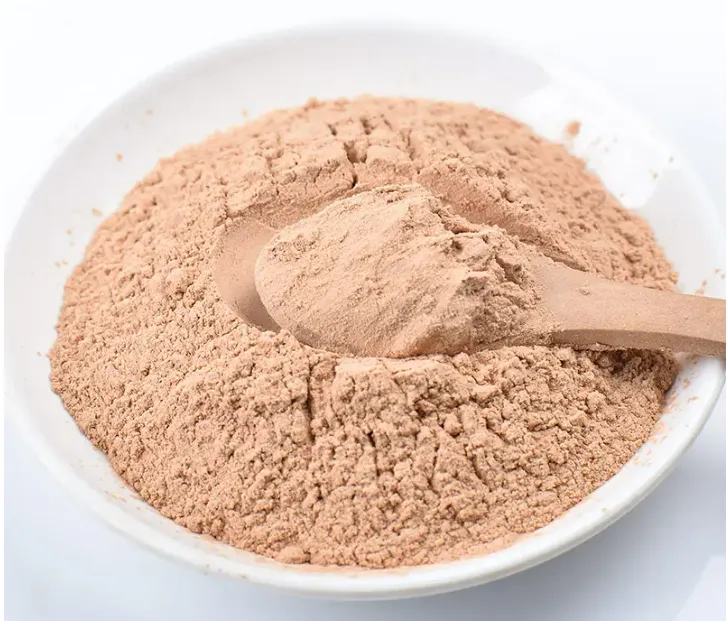- 0086-571-85302990
- sales@greenskybio.com
Best Answers to 7 Key Questions about Hawthorn Extract.
2024-12-15

1. What is Hawthorn Extract?
Hawthorn Extract is a natural substance derived from the hawthorn plant (Crataegus species). The hawthorn plant is a shrub or small tree that is native to temperate regions of the Northern Hemisphere. Hawthorn Extract contains a variety of bioactive compounds, including flavonoids, proanthocyanidins, and phenolic acids. These compounds are believed to be responsible for many of the potential health benefits associated with hawthorn extract.
Flavonoids, such as Quercetin and rutin, are known for their antioxidant properties. They can help to protect cells from damage caused by free radicals. Proanthocyanidins, on the other hand, have been shown to have beneficial effects on the cardiovascular system. Phenolic acids also contribute to the overall antioxidant and anti - inflammatory activities of the extract.

2. What are the Potential Health Benefits?
Cardiovascular Health
One of the most well - known benefits of hawthorn extract is its positive impact on cardiovascular health. It has been shown to help improve heart function by strengthening the heart muscle. This can be beneficial for individuals with heart failure or other heart - related conditions.
Hawthorn extract may also help to lower blood pressure. It does this by relaxing the blood vessels, which allows for better blood flow and reduces the pressure within the vessels. Additionally, it can help to reduce cholesterol levels, particularly LDL ( "bad" ) cholesterol, which is a risk factor for heart disease.
Antioxidant Activity
As mentioned earlier, the flavonoids and other compounds in hawthorn extract have antioxidant properties. Antioxidants play a crucial role in protecting the body from oxidative stress. Oxidative stress can lead to cell damage and is associated with a variety of chronic diseases, including cancer, heart disease, and neurodegenerative disorders.
By neutralizing free radicals, hawthorn extract can help to prevent or slow down the progression of these diseases. It can also help to improve overall health and well - being by reducing inflammation in the body.
Digestive Health
Hawthorn extract may also have benefits for digestive health. It has been used traditionally to treat digestive disorders such as indigestion, bloating, and stomach cramps. The extract may help to stimulate the production of digestive enzymes, which can improve the digestion and absorption of nutrients.
It can also have a soothing effect on the digestive tract, reducing inflammation and irritation. This can be particularly helpful for individuals with sensitive stomachs or those suffering from conditions such as irritable bowel syndrome (IBS).

3. How is Hawthorn Extract Made?
The process of making hawthorn extract typically involves several steps. First, the hawthorn berries, leaves, or flowers are harvested. These plant parts are rich in the bioactive compounds that are desired in the extract.
After harvesting, the plant material is dried to reduce moisture content. This helps to preserve the compounds and prevent spoilage. Once dried, the hawthorn material is then ground into a fine powder.
The powdered hawthorn is then extracted using a solvent, such as ethanol or water. The solvent helps to dissolve the bioactive compounds from the plant material. This extraction process can be carried out using various methods, including maceration, percolation, or Soxhlet extraction.
After extraction, the solvent is removed, leaving behind the concentrated hawthorn extract. The extract may then be further purified or standardized to ensure a consistent quality and potency.

4. Is Hawthorn Extract Safe?
For most people, hawthorn extract is considered safe when taken in appropriate doses. However, as with any supplement, there are some potential side effects and precautions to be aware of.
Some people may experience mild side effects such as dizziness, nausea, or upset stomach when taking hawthorn extract. These side effects are usually rare and tend to be mild. If these symptoms occur, it is recommended to stop taking the extract and consult a healthcare provider.
Hawthorn extract may also interact with certain medications, particularly those used to treat heart conditions. For example, it may enhance the effects of blood - pressure - lowering medications, which could lead to hypotension (low blood pressure). Therefore, it is important to inform your doctor if you are taking hawthorn extract, especially if you are on any medications.
Pregnant and breastfeeding women should also exercise caution when considering hawthorn extract. There is not enough research to determine its safety during pregnancy and lactation, so it is best to avoid it during these times.
5. What is the Recommended Dosage?
The recommended dosage of hawthorn extract can vary depending on several factors, including the individual's age, health status, and the specific form of the extract (e.g., tincture, capsule, or powder). In general, for general health maintenance, a daily dose of 1 - 2 grams of the dried extract may be sufficient.
For individuals with heart - related conditions, such as heart failure or high blood pressure, higher doses may be required. However, it is important to consult a healthcare provider before starting any new supplement, especially if you have an existing medical condition.
When taking hawthorn extract in tincture form, a typical dose might be 1 - 3 milliliters, three times a day. Capsules usually contain a standardized amount of the extract, and the dosage instructions on the product label should be followed.
6. Where Can You Buy Hawthorn Extract?
Hawthorn extract can be purchased from a variety of sources. Health food stores are a common place to find it. These stores typically carry a range of dietary supplements, including hawthorn extract in different forms such as tinctures, capsules, and powders.
Online retailers also offer a wide selection of hawthorn extract products. When buying from online sources, it is important to ensure that the seller is reputable and that the product is of high quality. Look for products that are third - party tested and have good customer reviews.
Some pharmacies may also carry hawthorn extract, especially those that have a section dedicated to natural or herbal remedies. However, it is always a good idea to consult with a pharmacist or healthcare provider before purchasing to ensure that it is appropriate for your needs.
7. How to Incorporate Hawthorn Extract into Your Diet?
There are several ways to incorporate hawthorn extract into your diet. If you are using the extract in tincture form, it can be added to a small amount of water or juice and taken directly. This is a convenient way to take the extract, especially if you are on the go.
Capsules are another easy option. You can simply take the recommended number of capsules with a glass of water, preferably with a meal. This can help to ensure proper absorption of the extract.
If you prefer a more natural approach, you can also make hawthorn tea. To make hawthorn tea, you can use either dried hawthorn berries or a hawthorn extract powder. Steep the berries or powder in hot water for about 10 - 15 minutes, then strain and enjoy. Hawthorn tea can be a pleasant and healthy addition to your daily routine.
FAQ:
What is Hawthorn Extract?
Hawthorn extract is derived from the hawthorn plant. It contains various bioactive compounds such as flavonoids, proanthocyanidins, and phenolic acids. These components are believed to contribute to its potential health benefits.
What are the main health benefits of Hawthorn Extract?
It may support heart health. For example, it could help regulate blood pressure, improve blood circulation, and reduce the risk of heart disease. It may also have antioxidant properties, which can protect cells from damage caused by free radicals. Additionally, some studies suggest it might aid in digestion and have a mild sedative effect.
Are there any side effects of Hawthorn Extract?
In general, when taken in appropriate doses, hawthorn extract is considered safe for most people. However, some individuals may experience minor side effects such as dizziness, nausea, or digestive discomfort. It is important to consult a healthcare provider before starting to take it, especially if you have existing medical conditions or are taking other medications.
How should Hawthorn Extract be taken?
The recommended dosage and method of taking hawthorn extract can vary depending on the form (e.g., capsule, tincture) and the intended use. It is typically taken orally. Usually, it is advisable to follow the instructions on the product label. However, for optimal results and safety, it is best to consult a healthcare professional who can provide personalized advice.
Can Hawthorn Extract interact with medications?
Yes, it can interact with certain medications. For instance, it may interact with medications for heart conditions, blood pressure, or diabetes. Hawthorn extract may enhance the effects of some medications, leading to potential adverse effects. Therefore, it is crucial to inform your doctor if you are taking or plan to take hawthorn extract while on other medications.
Related literature
- The Health Benefits of Hawthorn Extract: A Comprehensive Review"
- "Hawthorn Extract in Cardiovascular Health: Current Research and Future Perspectives"
- "Hawthorn Extract: Safety, Efficacy, and Potential Applications"
- ▶ Hesperidin
- ▶ Citrus Bioflavonoids
- ▶ Plant Extract
- ▶ lycopene
- ▶ Diosmin
- ▶ Grape seed extract
- ▶ Sea buckthorn Juice Powder
- ▶ Fruit Juice Powder
- ▶ Hops Extract
- ▶ Artichoke Extract
- ▶ Mushroom extract
- ▶ Astaxanthin
- ▶ Green Tea Extract
- ▶ Curcumin
- ▶ Horse Chestnut Extract
- ▶ Other Product
- ▶ Boswellia Serrata Extract
- ▶ Resveratrol
- ▶ Marigold Extract
- ▶ Grape Leaf Extract
- ▶ New Product
- ▶ Aminolevulinic acid
- ▶ Cranberry Extract
- ▶ Red Yeast Rice
- ▶ Red Wine Extract
-
Echinacea Extract
2024-12-15
-
Tongkat Ali Extract
2024-12-15
-
Shikonin
2024-12-15
-
Troxerutin
2024-12-15
-
Red Date Extract
2024-12-15
-
Ginseng Root Extract
2024-12-15
-
American Ginseng Root Extract
2024-12-15
-
Hawthorn powder
2024-12-15
-
Fenugreek Extract Powder
2024-12-15
-
Tamarind extract powder
2024-12-15





















